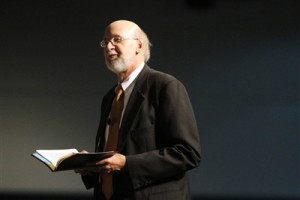Loving People When the Preaching is Done
 "Going to a certain building at a certain time to listen to a certain person talk about loving people is not the same as loving people." - Jerry Herships
We hear a lot from preachers about how we are supposed to love one another. We hear that Jesus died on the cross as an act of love and that if we are going to be followers of Jesus we must love the same way - sacrificially.
"Going to a certain building at a certain time to listen to a certain person talk about loving people is not the same as loving people." - Jerry Herships
We hear a lot from preachers about how we are supposed to love one another. We hear that Jesus died on the cross as an act of love and that if we are going to be followers of Jesus we must love the same way - sacrificially.
We hear stories of Good Samaritans who loved strangers and those in need in ways that many of us can only dream about: befriending a homeless stranger, selling it all a becoming a global missionary, and adopting children into our families as our own. These stories tug at our heart strings, making us wonder if we could really do that too. We sit in our pews as the preacher paints a picture of a world where Christians come together to impact the world and their local communities in a way that only an organized body could do.
We're inspired.
We get up after the last hymn, feeling empowered to changed the world, we walk towards the door, shake the preachers hand, tell him how create her message was, head to the car, and go to brunch.
Then we forget about it.
By noon or 1:00 PM we have forgotten what we were so empowered by just a few hours earlier and we go on with our lives.
Living out our faith in acts of love is often easier talked about from the pulpit but when it's time for boots to hit the ground we forget those inspiring and life-giving sermons that inspired us to do the work in the first place.

A few weeks ago I gathered with a group of United Methodist Clergy at a seminar led by Bishop Tim Whitaker. The topic for the two day seminar was Christian Mission in the Primitive Church.
The Primitive Church, the first 300 years of the Church's history, is full of examples of how the church cared for those in need as a way of living out their faith. Bishop Whitaker said this:
"Concern for the needy was coherent with the practices of ancient Israel and the ethical teaching of the prophets, but it was also an extension of both the teaching and ministry of Jesus of Nazareth. Most of all, it was seen as an expression of the love of Christians for one another and of the love of Christians for their neighbors as a response to the generosity of God’s love through Jesus Christ. In the early third century, Tertullian remarked that it was common for people to say, 'See how these Christians love one another.'"
The Primitive Church's love for one another, as well as the community around them we noticeable. They stood out. Hospitality was given to strangers, food and financial support was given to those who needed it, and funerals were provided for people who could not have afforded one otherwise. For the Primitive Church, there was more to talking about loving people. Their talk was matched with action.
I ordered Last Call last year. It was one of those books I really wanted to read but it kept getting pushed to the side when other things came up (like my Master's’ thesis). Pastor Jerry Herships' memoir is a story about the church today being the church of ~1700 years ago. By starting a church with a mission of serving the poor in Denver, CO, and being a church for people who are typically not welcomed or loved in a typical church, Jerry is showing just how the church today can return to its roots and love people after the talking is done.
Living out your faith is hard.
It's hard to be aware of the people around us ALL the time.
It's hard to know who to help and when.
It's hard as hell to love people who don't love you back or who we don't deem worthy of our love, but that's the beauty of the Gospel.
Christ loved us, those who weren't worthy in the eyes of the temple. Christ showed love when the preaching was done. He didn't wait for people to come to him but instead he went, which is exactly what Jerry is doing.
We can learn a lot by listening to good preaching. But we can learn even more, and love even more, when we go out and love after the preaching is done.
I ordered Last Call last year. It was one of those books I really wanted to read but it kept getting pushed to the side when other things came up (like my Master's’ thesis). I had some time this week so I decided to put a dent in it, with the intention of finishing it over the rest of next month. A few hours later I had finished the book. It is that good. I am not a strong reader. I never have been. But when I first started Jerry’s book I knew after the introduction that I this was something I needed to read and read quickly. I will be sharing my reflection on this book about God, bartenders, and bad comedians over the next weeks. I hope you will join me. Cheers!